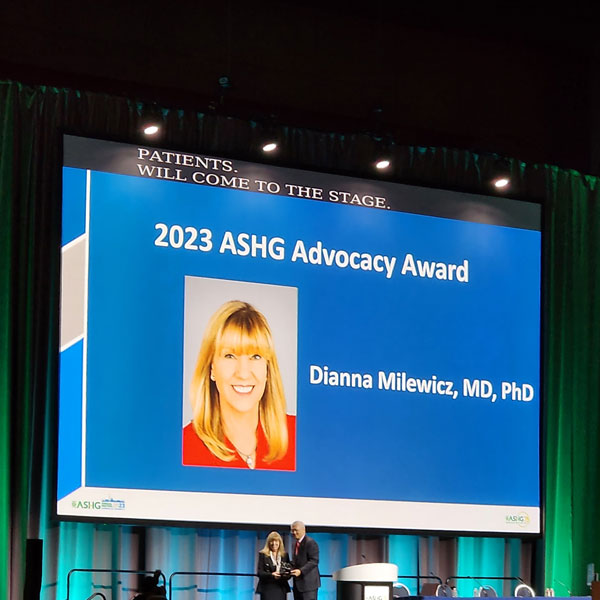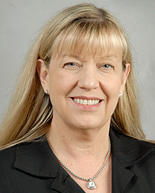ASHG honors Milewicz with Advocacy Award


The American Society of Human Genetics (ASHG) has named Dianna Milewicz, MD, PhD, professor and President George Bush Chair in Cardiovascular Medicine, as the 2023 recipient of its Advocacy Award.
The Advocacy Award is bestowed upon individuals or a group of individuals who have exhibited excellence and achievement in promoting the science of human genetics and its application for the common good.
“Dr. Milewicz’s work has led to extensive discoveries and life-saving care related to aortic diseases,” said ASHG president Brendan Lee, MD, PhD. “She exemplifies the Advocacy Award in her engagement and collaboration with patients with these diseases, their families, and a wide spectrum of professionals who care for these patients. It is clear that they all express gratitude and admiration for her work.”
Milewicz’s longstanding efforts to educate the public on the genetic basis of aortic diseases has led to life-saving and preventative care for many. Her work has ranged from collaborations with professionals including cardiologists and genetic counselors, to leading the creation of cross-disciplinary teams that have developed clinical guidelines to optimize care for patients with aortic disorders. Many patients can now rely on early detection and correct diagnoses to avoid a premature death.
She is one of the founders and currently serves as chair of the Montalcino Aortic Consortium (MAC), whose mission is to provide evidence-based data for gene- and variant-specific management of genetically-triggered thoracic aortic disease. Milewicz’s goal is for the data emerging from MAC to serve as a template for other adult-onset disorders associated with extensive clinical and phenotypic heterogeneity.
“I established The John Ritter Foundation for Aortic Health with the simple mission of preventing premature deaths through research and awareness of risk factors for acute dissection. Establishing the John Ritter Research Program to be led by Dr. Milewicz at the University of Texas Health Science Center at Houston in 2008 made perfect sense for us,” said Amy Yasbeck Ritter, chair and founder of the foundation, in her nomination letter. “Doctor Milewicz’s mission to identify genetic triggers for thoracic aortic disease and defining gene-specific management has changed the lives of thousands of people and their families. Her lab not only provides groundbreaking, lifesaving research for our community but also provides genetic counseling at no cost to dissection survivors and their family members.”
Milewicz completed her postgraduate training in internal medicine at the University of Texas Southwestern Medical School, where she obtained her medical degree and doctor of philosophy and also completed her internal medicine residency. As a medical genetics fellow at the University of Washington, she was first author on the paper demonstrating that fibrillin-1 is disrupted in cells from individuals with Marfan Syndrome as a result of underlying pathogenic variants in the corresponding gene, FBN1.
Upon returning to Texas, she set up her own laboratory at UTHealth Houston. Milewicz has been the director of the MD/PhD program offered jointly between UTHealth Houston and the University of Texas MD Anderson Cancer Center institutions for over 10 years and has been extensively involved in physician-scientist training. She serves as the medical advisor for the John Ritter Foundation for Aortic Health, which strives to increase public recognition of aortic disease.
Founded in 1948, the American Society of Human Genetics is the primary professional membership organization for human genetics specialists worldwide. Its nearly 8,000 members include researchers, academicians, clinicians, laboratory practice professionals, genetic counselors, nurses, and others with an interest in human genetics.